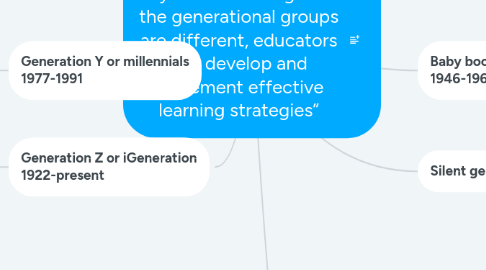•Generations• “by understanding how the generational groups are different, educators can develop and implement effective learning strategies”
by anya mishakina

1. Generation X 1965-1976
1.1. Visual simulation/ role-playing/self-directed types of learning
1.2. Need for feedback
1.3. Problem solving
1.4. Debate panel / Teamwork
1.4.1. Multi-media and technology use
2. Generation Y or millennials 1977-1991
2.1. Online learning =live learning
2.2. Podcasting/ Vodcasting
2.2.1. Visual simulation and action
2.3. Gaming
2.4. Social interaction
2.4.1. Team-building activities
3. Generation Z or iGeneration 1922-present
3.1. Multitasking
3.2. One-on-one communication
3.3. Social media
3.3.1. YouTube
3.3.2. Snapchat
3.4. Prefers to know how to access, create & assimilate information
3.4.1. Immediate constant feedback
3.5. Designing educational activities
4. Silent generation 1937-1945
4.1. Traditional classroom
4.2. Problem solving/ case studies
4.3. Discussions
4.4. Note-taking
5. Baby boomer generation 1946-1964
5.1. Experienced based education
5.2. Live > Online
5.3. Handouts / discussions
6. I would say that a highly competent educator, when selecting teaching strategies for different generations, purposefully focuses their resources so that everyone is interested in learning. Regarding Generation X, these are very hardworking people who may have difficulty with new technology, but most of them understand that technological innovation is the key to success. Generation Y may be a little lack of self-discipline, but if the goals will be clearly defined, then success is inevitable. The main thing is to include creativity. Perhaps if a member of generation Z needs to learn a foreign language, they are likely to turn to a native speaker in a language forum or give preference to a learning application such as Duolingo. In any case, the learning process can be made interesting by combining different methods and tasks, not forgetting to take into account the peculiarities of different generations.


